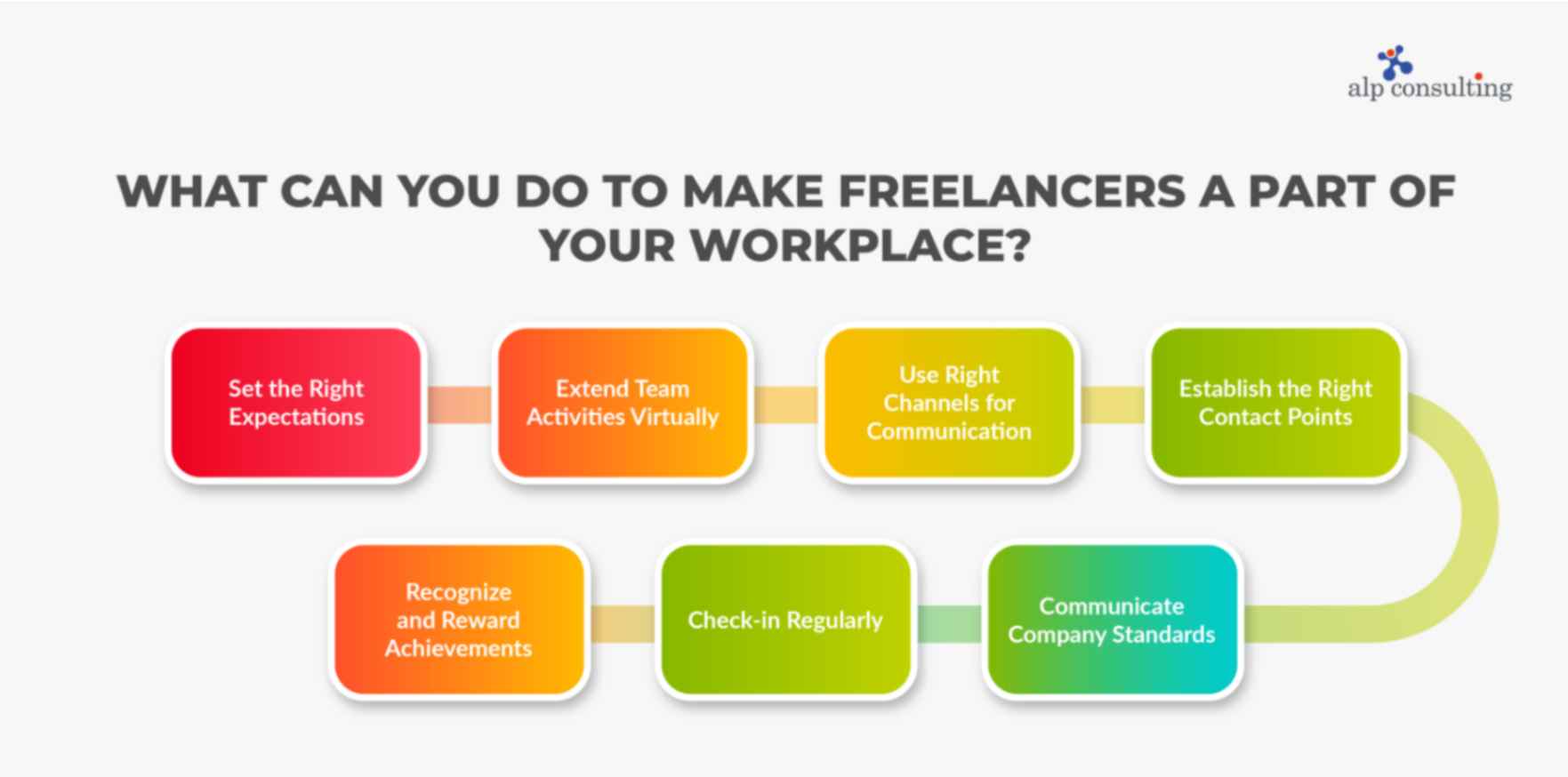
Benefits of Using Retained Executive Search in Recruiting
05/06/2024
5 Ways HR can Build a Feedback Culture at the Workplace
10/06/2024A freelancer is not a regular employee. Remembering this is key when it comes to handling the relations a company has with them. Ghatotkacha, the son of Bheema in the epic Mahabharata was perhaps the first freelancer in history. He fought on the side of the Pandavas but without a chariot unlike the other warriors on the side of the Pandavas. He had remarkable strength and was an expert in sorcery, the powers he gained from Lord Krishna himself, which was one of the reasons the Pandavas were victorious in the battle.
An example of a freelancer in documented history is Nikola Tesla, the inventor of AC (alternating current) and the AC motor, something which has changed the world of energy forever, though he never gained financially from it. The famous Walt Disney was a freelancer too, drawing a picture of a horse for his neighborhood doctor at the age of 4 and then going on to draw for his school newspaper when he was only 15.
Managing Freelancers in Modern Times is More Difficult
A difference here? There was no difference in the time zone as Ghatotkacha and the Pandava army were fighting on the same battlefield at the same time. There was no Internet at the time of Nikola Tesla too, so he would be on the spot describing his inventions to any takers as and when he chose to. Working with a freelancer in modern times is even more challenging than it may have been in the past, and that is because of modern-day conveniences such as the Internet and video calling.
Another difference is that modern-day freelancers will be bound by the laws of the country they live in, which you, as a company, would need to consider. They would have different requirements too for this reason. This in turn makes each freelancer’s expectations different from the other, and the goals they have will be more individualistic than collective. In other words, everyone is fighting their own battle at work, day in and day out.
What Can You Do to Make Freelancers a Part of Your Workplace?
Here are a few things you can do to ensure that your freelancers feel welcome in their new workplace.

1. Set the Right Expectations
Freelancers are not employees. When you set the right expectations with them, it helps create a better and more inclusive workplace, while also getting the work done on time in the way you want it. Freelancers are also quite concerned about their individual benefits so letting them know how they can benefit in both the short-term and long-term would help you gain their trust.
Setting the right expectations with freelancers can also help prevent any disputes in the future. But never be too closed for feedback. Accepting feedback in time can prevent a freelancer from being disgruntled or upset and could save your company an asset. Setting the right expectations also provides a reasonable level of transparency and allows the freelancer to plan, and we all know the importance of great planning in any freelance job.
2. Extend Team Activities Virtually
Though freelancers are not regular employees, remember that they are part of the company too. If they are confused or disenchanted for whatever reason, it can affect the reputation of the company. Extend any team building or team-strengthening activities to freelancers also, so that they feel welcome and stay on to add value to the company.
Whatever the case is, they must not be just silent observers who only work for money. That would make them more like mercenaries. Aldous Huxley famously said, “We participate in a tragedy, at a comedy we only look”. The workplace is one where we need to avert both tragedies and comedies. Make sure that you give freelancers enough room to participate but don’t overdo this either.
3. Use Right Channels for Communication
Use the right communication channels when talking to a freelancer, each based on its respective strength. Email is clear and concise while also being a clear record of uninterrupted communication. Use an e-mail when you need to communicate something of great importance, the freelancer can bookmark for future reference. Use an e-mail also when you want to communicate something to a group of freelancers and their manager/management.
SMS/WhatsApp is even more precise than mail but may not communicate the subject in its entirety. Use SMS/WhatsApp when you want to tell the freelancer about an event where attendance is not compulsory, or if it is then as an additional reminder for an e-mail dispatched to the freelancer. Use SMS/WhatsApp also when you want to have an immediate two-way communication with the freelancer, that will save your business time. Wan to brainstorm instead? Switch to video call.
4. Establish the Right Contact Points
Also, set up clear points of contact the freelancer can approach when in need. These points of contact may be with other freelancers, probably as part of a special group you have created that help support each other. One or more of them could be a person or team within HR, who typically manages the queries or feedback that freelancers have. They would also be in contact with the team lead or manager, to understand requirements at work. Use software, if you want to, to set everything up.
Make sure that these contact points are also provided with the details of the freelancers and that they have sufficient time to devote to clearing their doubts or training them to be better at work. The contact points must be able to correspond with people from HR or higher management to solve the problems that may arise. Please note that it is not necessary to reveal the organizational hierarchy to a freelancer, and in fact this may be counterproductive.
5. Communicate Company Standards
What are your company’s expectations from each freelancer and how does it recognize their achievements? Share this with every freelancer you bring into the fold. Has the company secured an award or recognition that guarantees it is a great place for freelancers to work in? If so, then this is something worth sharing.
Has the company done anything to support a community or group the freelancer belongs to? What resources does the company provide generally to a freelancer and is this a special case with special provisions? Try to bring these aspects to his/her notice without being overly vocal about it. Be transparent also about the salary you are paying freelancers of a particular experience level or for a particular job.
6. Check-in Regularly
Check-in regularly to ensure your freelancers are working well but make sure you do not micromanage. This will help maintain the emotional wellness of your remote workforce. It will also help keep project timelines on track, with each stage progressing the way it should. Also make sure your freelancers are on board with the latest developments, such as being aware of how to use newly introduced technology, for instance.
Provide feedback to every freelancer on your team. Also, take feedback from freelancers periodically to understand how the company is doing and if their needs are being met. Invite freelancers to suggest ways of improving the workflow and individual employee productivity, if anyone has worked as a full-time employee earlier and is now in a senior position and capable of providing such guidance.
7. Recognize and Reward Achievements
Remember that some of the freelancers you employ may be the sharpest minds in the business, able to go from zero to hero in any task you assign them in very little time. They could mentor your full-time employees and suggest techniques that will make them more productive at work. But every showman needs an audience! Your freelancers need you too!
Recognize their milestones as you would those of your other employees. A pat on the back and a nod in time can save your company the risk of them jumping over the fence and into your competitor’s backyard.
To Err is Human, To Forgive Divine
Everyone makes mistakes and, no matter how good your freelancer is, he/she is bound to err. At this juncture, you can choose to set an example for everyone and admonish the freelancer or quietly look over it, suggest improvements and move on. Because a freelancer is not an employee, it shouldn’t give you a free hand to do as you please. Giving constructive feedback and criticism is a way towards improvement and there should be no exception made even for a freelancer.
Remember a freelancer may not be as obligated to speak well of you as an employee would be. So, not only is it divine to forgive an error, but you can also safeguard your company’s reputation and it gives you an edge over the competition as mentioned earlier. Freelancers are key assets to any company, people who are the prime movers in any company, and the company that realizes this the soonest will be the one ahead in the race.
Contact Us For Business Enquiry

Roshan Suresh
Roshan Suresh is the Vice President at ALP Consulting with over 17 years of experience in technology and leadership hiring. He specializes in full-time recruitment for IT products, e-commerce, services, and BFSI sectors, driving end-to-end hiring strategies for top enterprise clients. With a strong foundation in R&D and technical recruitment, Roshan has built high-performing teams that deliver exceptional talent solutions across India.




